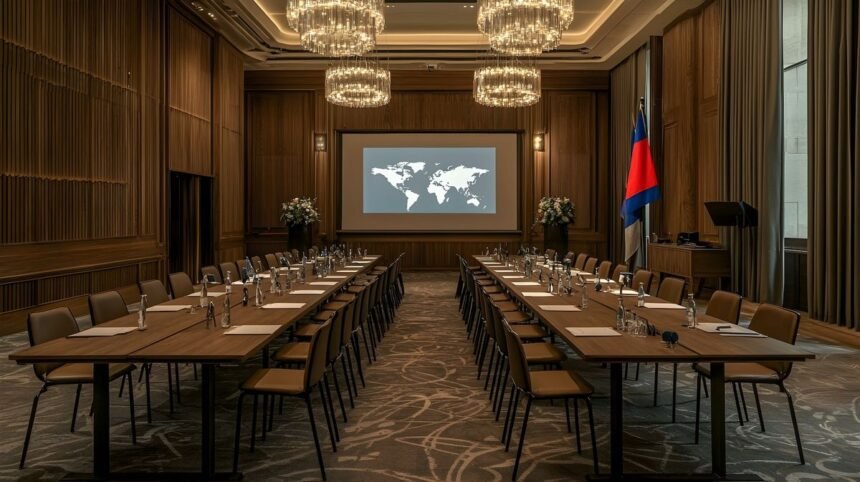The intentions of international travelers to the United States this year have been watched closely for months, due not only to the effect of economic turbulence but also concerns about how they would be received due to new federal attention on entry and exit procedures. And while it appears most inbound transient business travel has more or less stabilized, even as some leisure demand softens, there is some evidence of a slowdown in demand for the U.S. as a destination for international events.
The upshot of any slowdown, be it reluctance among foreign corporations to hold meetings in the U.S. or reluctance among international would-be attendees to make the trip, could be a level of negotiating opportunity in the U.S. for short-term corporate meetings.
Most planners themselves believe the events of 2025, including Trump administration’s tariff strategy and concern about treatment of inbound visitors, have negatively affected their assessment of the state of meetings, according to a Northstar Meetings Group survey. (Like BTN, the Northstar Meetings Group is owned by the Northstar Travel Group.)
About 48 percent of 386 meetings planners surveyed late last month by Northstar Meetings Group—a quarter of whom were corporate meeting planners and another 27 percent independent third-party planners—indicated their outlook for their meetings and events had grown more pessimistic over the prior two months, compared with 22 percent whose optimism increased. Those figures are similar to a March Northstar survey, in which 52 percent of planners said they had become less optimistic, and sharply different from a May 2024 survey in which 14 percent said they had become less optimistic.
Hotel analytics firm STR, meanwhile, in a June 24 research note suggested international inbound meeting attendees might not be filling contracted U.S. room blocks at expected rates.
“In the week ending 14 June, for example, there were noticeable percentage-change differences between occupancy on the books and actualized occupancy in markets like Las Vegas, Houston, Philadelphia and Orlando,” according to STR. “One possible reason for that gap is group room blocks not matching expectations, especially with international travelers. U.S. group demand has dipped year over year in three consecutive weeks, but that is not enough of a sample to be considered a trend.”
STR noted the resilience of group travel as part of hotels’ business in recent years. “Any sustained downturn would warrant a reevaluation of the overall demand outlook,” it concluded.
Grant Caplan, president of corporate travel and meetings procurement consulting firm Procurigence, told BTN that the current U.S. focus on immigration enforcement and entry and exit procedures has caused some of his European clients to look elsewhere for meetings site selection, while U.S. clients also focus on domestic destinations.
“The No. 1 destination for U.S. clients is the U.S.A., and No. 2 would be all the rest of North America, and then European meetings definitely slowed way, way down,” Caplan said. “For my European clients, however, staying in Europe or going elsewhere, avoiding the U.S.A., is a good thing and they’re very unimpressed with the U.S.A. at this moment.”
Meetings management and site selection firm Troop this month provided BTN with lists of top destination searches on the company’s platform over the prior 90 days and 365 days. Searches for some international destinations, including London, increased in the prior 90 days from the full-year list, and Toronto and Paris each debuted in the more recent top 10, while there was a “significant decrease” in searches for New York, although searches for Seattle increased, according to a spokesperson, who noted the data applied only to searches, not final booking decisions.
Finding Opportunity
Littleton, Colo.-based Kinsley Meetings is an independent meetings management company that handles corporate and association meetings, and president Steve Kinsley told BTN the current U.S. corporate demand environment has remained relatively static, with supply compression in 2026 due to the FIFA World Cup and ongoing convention center renovation.
“The corporate entities we work with haven’t changed as far as the way they’re doing business now. Most of our corporate clients are domestic,” said Kinsley, who is a board member of Meeting Professionals International and reported general optimism from attendees at its annual World Education Congress convention last week. “In that regard, it’s fairly typical for us.”
Still, Kinsley said, there is enough softness in the market that planners sourcing short-term corporate meetings could find a negotiating opportunity.
“From what we’re seeing in booking some smaller stuff—40 to 50 people that’s fairly short-term, three to six months out—we’re getting everything we need there,” Kinsley said.
Caplan also suggested hoteliers might be sensing a slowdown in meetings demand.
“Other U.S. meetings probably are slowing just a little bit, but we see U.S.A. meetings for U.S.A. clients are not slowing down in my opinion,” he said. “But talk to hoteliers, and you’re going to find that they feel slow, especially from meetings for companies outside the U.S. Every hotelier I talk to says we’re just waiting for this all to change.”
That sense is translating into negotiating opportunity, he said.
“Across the board, regardless of [hotel] brand or independence or anything, I’m finding a little softness on some of those rates, and in other places I’m finding significant softness,” Caplan said. “More expensive markets don’t have the room to stay firm on their prices if they were relying on inbound business from other countries and they’re not getting it and now have to rely on Americans.”
Caplan noted the flexibility that independent hotels can offer might be giving them a competitive advantage in a market in which chain-affiliated hotels are restricted by brand standards that include food and beverage requirements, for example, in meeting space bookings. “In our site selection and negotiation, we’re finding that creativity and flexibility at smaller hotel groups or independent hotels is winning over that brand standard that’s holding them back in a tough time,” he said.
As with transient travel, international meetings demand remains fluid. Firm conclusions on the immediate future of corporate meetings demand remain elusive, and many meetings executives contracted by BTN declined requests to assess the market. Caplan, though, suggested this year’s changes weren’t going away any time soon.
“The U.S.A. is a big ship to steer, and the fact that it’s steered so quickly off-course with this particular geopolitical change is unusual, and that’s why it’s going to be shocking for the entire industry in different ways,” Caplan said. “When the ship steers back onto its previous course, I think it’s going to take a long time to come back to where we were. I don’t think that it was easy to steer off course, and it will be difficult to re-steer back on course.”











